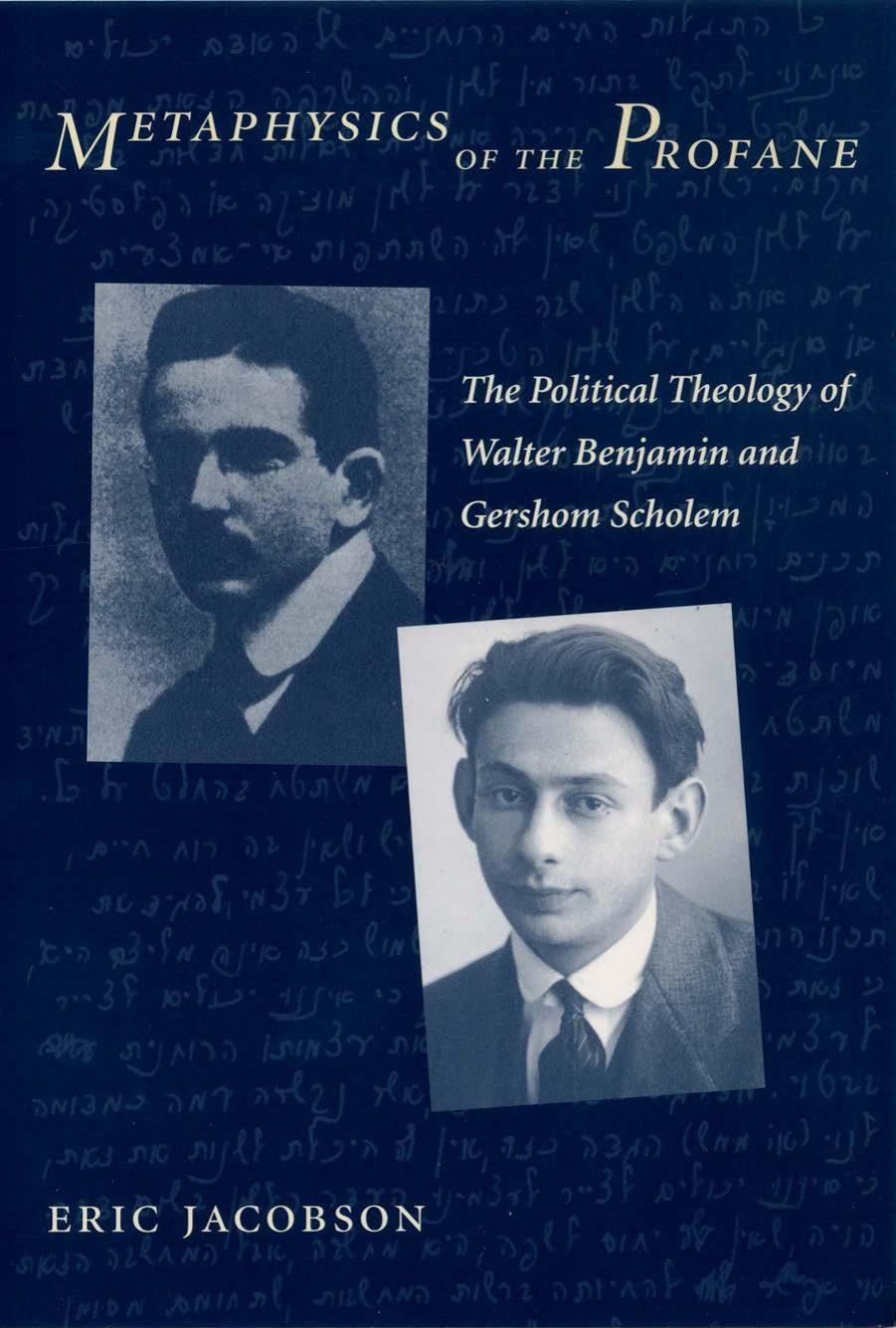Metaphysics of the Profane by Eric Jacobson

Author:Eric Jacobson
Language: eng
Format: epub, pdf
Tags: Religion/Judaism/General
Publisher: Columbia University Press
Published: 2011-11-03T16:00:00+00:00
THE JUSTICE OF PROPHECY
Another newly published text in Scholem’s archival papers is a short essay entitled “Über Jona und den Begriff der Gerechtigkeit,” (On Jonah and the Concept of Justice). Written more than two years after the transcription of Benjamin’s “Notes to a Study on the Category of Justice,” it appears that Scholem continued to formulate a notion of justice that drew and expanded upon Benjamin’s initial, materialistic reflections on the relationship between good and goods. It is, however, unclear whether Benjamin was familiar with this text when Scholem composed it in Switzerland. Several years later, in December 1924, Benjamin certainly received a copy from Ernst Simon, although it is possible that he may have already been in possession of the text.75 In “On Jonah and the Concept of Justice” Scholem turns to the idea of a prophetic notion of justice, informed by Jonah, Isaiah, and Job, as well as the juridical precepts of the Psalms. As in the first part of his “Theses on the Concept of Justice,” Scholem concludes this text with twelve theses on prophetic justice that appear to form the foundation of the second part of the “Theses,” written no earlier than January 1921, and perhaps many years later.76 Several of the statements in the second part of the “Theses” appear to be transcriptions with slight changes of the theses that conclude the discourse on Jonah.77 Moreover, the Hebrew categories that form a central part of the discussion—tzedek and mishpat—not only correspond to Benjamin’s speculation toward the end of his text but were to appear again in Scholem’s late essay “Die Lehre vom ‘Gerechten’ in der jüdischen Mystik” (“The Teachings of the ‘Just” in Jewish Mysticism”), thus pointing again to Scholem’s lifelong commitment to the early political theology. 78
In the discourse on Jonah justice is understood as the central concern of the prophets. But, in contrast to the others, the paradoxical event is deemed “key to the understanding of the prophetic idea” itself.79 Both the major and minor voices of the prophets are either articulating the word of God, imploring for repentance, or prophesying the meaning of time. Fulfilling these tasks with both pedagogical and didactic meaning, Jonah attempts to circumvent the “immortality of the divine word” as the plot seeks to transcend the finite expression of divine prophecy.80 The prophets offer the ultimate form of Jewish instruction in that their prophetic teachings reveal a glimpse of the true nature of “the order of the righteous,” says Scholem. The didactic character of the text is itself deemed a prophetic category.81 But the pedagogical ensues not from the word of the prophet, as is the case with the other narratives, but from “the greater problem inaugurated by divine postponement.”82 For this reason Jonah’s prophecy plays a crucial, liturgical role in Judaism, Scholem explains, as a result of the revelation of divine postponement that transpires.83
The turning point in the concept of justice occurs at the outset, at the moment when the city of Nineveh heeds the words of the prophet and repents.
Download
This site does not store any files on its server. We only index and link to content provided by other sites. Please contact the content providers to delete copyright contents if any and email us, we'll remove relevant links or contents immediately.
| Haggadah | Hasidism |
| History | Holidays |
| Jewish Life | Kabbalah & Mysticism |
| Law | Movements |
| Prayerbooks | Sacred Writings |
| Sermons | Theology |
| Women & Judaism |
The Power of Habit by Charles Duhigg(3139)
Man's Search for Meaning by Viktor E. Frankl(2671)
Mckeown, Greg - Essentialism: The Disciplined Pursuit of Less by Mckeown Greg(2441)
MOSES THE EGYPTIAN by Jan Assmann(2417)
Devil, The by Almond Philip C(2331)
The Complete Dead Sea Scrolls in English (7th Edition) (Penguin Classics) by Geza Vermes(2283)
Unbound by Arlene Stein(2275)
I Capture the Castle by Dodie Smith(2038)
Schindler's Ark by Thomas Keneally(1887)
The Invisible Wall by Harry Bernstein(1805)
The Gnostic Gospel of St. Thomas by Tau Malachi(1798)
The Bible Doesn't Say That by Dr. Joel M. Hoffman(1680)
The Secret Doctrine of the Kabbalah by Leonora Leet(1610)
Political Theology by Carl Schmitt(1586)
The Jewish State by Theodor Herzl(1534)
A History of the Jews by Max I. Dimont(1531)
The Dead Sea Scrolls Bible by Martin G. Abegg(1517)
The Book of Separation by Tova Mirvis(1488)
Oy!: The Ultimate Book of Jewish Jokes by David Minkoff(1372)
